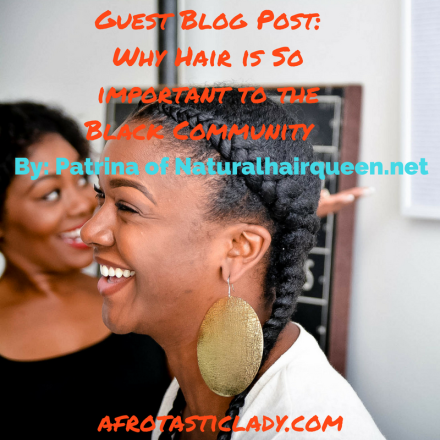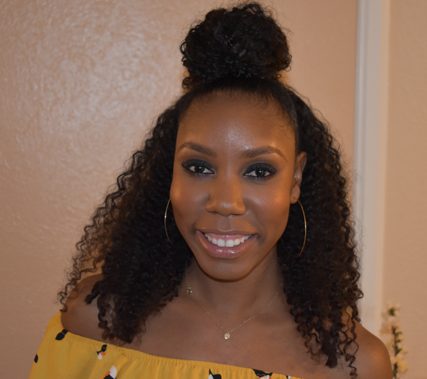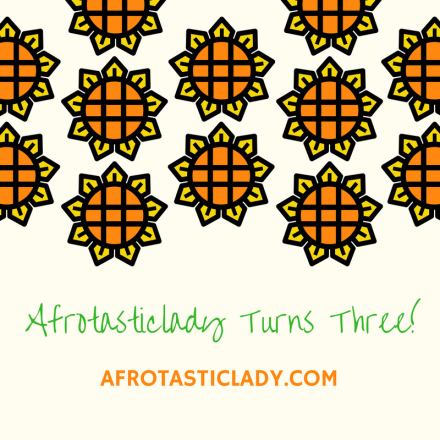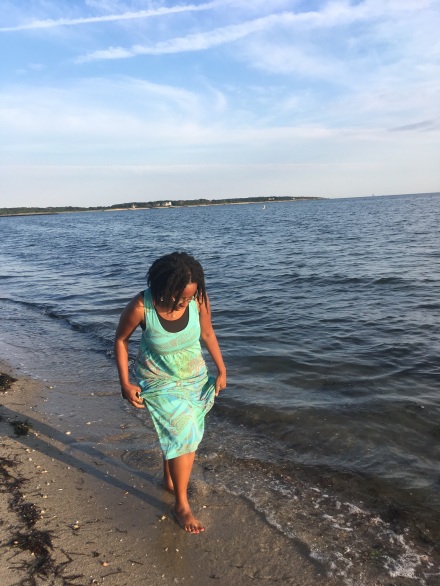(Hey, y’all! It’s been a minute since I’ve had a naturalista swing by the blog! Patrina of naturalhairqueen.net is a beautiful naturalista who is here to drop some knowledge on the social, political, and economic meanings of Black hair. I’m thankful that Patrina came by to share her words as it is a well-written and significant piece. I encourage you to take some moments to read her words too! Blessings, Monica aka afrotasticlady)

It’s not just hair. If you mention the deep significance of African-American hair to nonblacks, you might get a blank look. They probably won’t understand why you are angry when you see cornrows being culturally appropriated. Nor will they get your frustration of not being able to find black hair products on the supermarket shelf.
The way we wear our hair isn’t just about self-expression. Our kinky hairdos and our coily locks are beautiful and unique, but it’s never just about you as an individual. Yes, we struggle with self-acceptance, but it’s not the same as a Caucasian teen wearing a mohawk to be rebellious, or a middle-aged white woman dying her hair bright red to do something fun for the summer.
How we style our hair goes way beyond that. It’s almost as if we’re representing the entire race. African-American hair is woven into a traumatic history of cultural discrimination, political turmoil, and fighting for basic human rights.
As time passes, we’ve seen mega-companies like L’Oréal scramble to sell to the one market they’d ignored for years. And it’s about time they paid attention, because the black hair and cosmetics industry is worth $9 billion per year, according to Black Men in America.
The black population is no small market. Nielsen reported that blacks will reach a buying power of $1.3 trillion by the end of 2017. We want to look good and we show it with our wallets, but it goes much deeper than just vanity.
African-American hair bonds and unites us as a people. However, the scars of having been ignored, shunned, and frowned upon still exist. In this post, we’ll discuss why hair is so important in the black community.
Hair is Interwoven into Black History
Black obsession with hair didn’t begin in America, nor does it date back to when Africans were kidnapped and sold as slaves. Hair has always been important to Africans, and we see evidence of this by studying the tribal traditions of our ancestors.
Africans made elaborate hairstyles for celebrations and rites of passage, and they also used styles to determine rank, social class, fertility, manhood, age, and wealth.
So, it’s only natural that we would turn to hair to express ourselves since that’s what our ancestors did.
When Europeans stole Africans for use as slaves, they uprooted an entire legacy of hair. Being far away from home without styling tools or nourishing butters like Shea, meant that Africans had no way to care for their hair. For the first time, blacks no longer celebrated their hair. Rather, both blacks and whites saw it as a problem.
In 1909, Garrett Morgan invented the first relaxer, and we saw black women flocking to take care of the “problem”.
The Struggle is Real
Why do we pay so much attention to hair? Because managing African hair takes time, patience, and dedication. Whether you have natural, relaxed, or a protective style like braids, you are undoubtedly going to spend hours doing your hair.
It’s kinky hair’s coily characteristics that make it a challenge. As the tiny coils cling on to each other and tangle, the hair mats until you have time to detangle it. And the detangling itself can take a long time to master without breaking the hair strands.
As we move into the Natural Hair Movement, American women are spending more time and money than ever on perfecting hair. Hair is connected to self-esteem and the way we feel about ourselves and being black.
Do we allow it to go natural? Do we straighten it to appear more “acceptable” in the workplace? These are complex questions that every woman must answer repetitively over the course of a lifetime.
Changing jobs or even just posing for a professional picture might change a woman’s mind from one day to the next about her hair, and whether it’s good enough. It’s this constant battle that leads us to obsess over hair and continuously “fix” it until it’s ready to be seen by the public eye.
A Common Bond Between Sisters
Our hair connects us. It’s the internet that brings sisters together. Now we can freely discuss and exchange ideas about how to take care of our complex hair, something we haven’t had since before slavery.
Sure, we always had casual conversations with friends and strangers alike, but You Tube and blogs made our connections stronger and more frequent.
It’s a grand reuniting of people affected by the African diaspora. These are the conversations we were meant to have hundreds of years ago. But better late than never, and it makes the connections even more compelling.
It’s not just the ability to research information, but a way of socializing. Our hair journeys give us something to talk about, share, and bond over. And yes, it feels like we’re celebrating once again.

Patrina is the founder of Naturalhairqueen.net; a blog to educate and inspire women with natural hair. Patrina just celebrated her 10-year natural hair anniversary, and achieved her goal of waist length hair. With the knowledge she has learned over the years she is dedicated to share her knowledge, and experience to educate women who wish to have moisturized, healthy natural long hair.
Social Media:
Website: www.Naturalhairqueen.net
Facebook: www.facebook.com/naturalhairqueensite/
Twitter: https://twitter.com/NatHairQueen
Instagram: https://www.instagram.com/nathairqueen/




